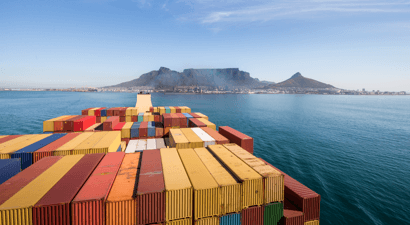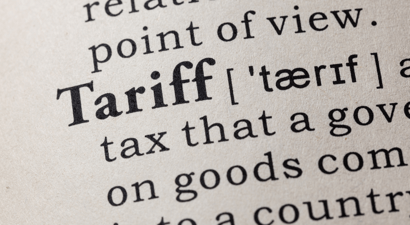The South African Ship Registry: To Bareboat or Not?
From the earliest days of the first Dutch settlement at the Cape, locals have been tempted to describe themselves as a "seafaring" nation. Whether this is accurate is open to debate. Although we do have a proud history of vessels that were registered on our flag, the size of the fleet has always been disproportionate to the volume of exports from South Africa (be it mineral resources, manufactured goods or reefer exports).
The tipping point was probably the Comprehensive Anti-Apartheid Act promulgated in the US in 1986 which had an immediate and dramatic effect on South African Ship-owners but in the main on the national carrier, Safmarine, removing their vessels off the South African register and onto "flags of convenience" such as the St Vincent and Grenadines, Sri Lanka and others. The vessels were owned by foreign subsidiaries that were deemed "domestic" companies for the purpose of consolidated group tax and were therefore at least notionally still "South African" vessels and largely continued to employ South African seafarers. Safmarine was sold off to different interests in the late 1990's, although the name and brand is still displayed on a fleet of modern container vessels. Sadly, however, by the start of the 21st century the number of large "blue water" cargo vessels on the South African flag had dropped to single figures.
Much has been written about Operation Phakisa and the Blue Economy, the culmination of the Maritime Transport Policy first published on 10 August 2010. Some of the aims of the initiative were noble and met with much enthusiasm by Government and industry alike, while other elements were met with cynicism as to whether they were realistically achievable.
The Ship Registration Act, No. 58 of 1998 ("the Act") pre-dates Operation Phakisa by more than a decade. Enacted in 1998, it would take a further six years before promulgation, in the main as a result of the complex process of drafting detailed regulations for the different categories of blue water vessels, commercial vessels and pleasure craft. Although we have become accustomed to the "new" Act and the efficient manner in which the centralised office of the Registrar of Ships is opened to the benefit of the extended maritime community, it is worth reminding present day users of the infrastructure created by the Act and of the benefits of the provisions of the Act, as compared to the relatively scant ship registration provisions of the Merchant Shipping Act, No. 57 of 1951 ("the MSA"). For the first time the ship registration model was brought into line with other leading maritime nations and in particular that of the United Kingdom. Gone were the problems associated with the MSA, in terms of which the Department of Transport, inter alia, had a discretion as to whether or not they "may" register a mortgage over a vessel under 25 tons, a discretion which they invariably exercised against the registration of such a mortgage over a "small" (but very often high value) vessel, such as a luxury yacht. As a result, banks and attorneys had to resort to other forms of security such as Notarial Bonds, which were not always effective.
These frustrating shortcomings were removed by the promulgation of the Act. One issue that the Department of Transport (now SAMSA) has had to grapple with was whether to allow the demise or bareboat chartering "in" or "out" of the vessels onto the ships register. The policy adopted and enacted was clearly to allow vessels registered on a foreign register to be bareboat chartered to a South African national, as defined in the Act (meaning a South African citizen or "body corporate" established in terms of a law of the Republic with a place of business in the Republic), which was then entitled to register the vessel on the National Flag. At the time it was stressed that the bareboat "out" of South African vessels would not be dealt with in the Act.
There was a concern that the “new” Act should not be perceived in the international maritime community as creating a "dual flag" which conjures up notions of "flags of convenience". Interestingly, the Act does not preclude or prohibit a vessel registered under our national Flag to be bareboat chartered "out" but in practice it will not be allowed and no provision is made therefore in the Act. When the Act was first promulgated in 2004, we had the very useful mechanism in terms of which a foreign vessel, inevitably funded by foreign banks and more often than not subject to a group or "fleet" mortgage, to be bareboat chartered to a South African national, could be registered on the South African Ships Register as a South African ship.
The “new” Act improved and streamlined the registration of South African ships and hundreds of ships owned by Governments or its’ parastatals (research and compliance vessels, fishing vessels and pleasure craft) continued to be registered on the Register. By 2015, some eleven years after the promulgation of the Act, the absence of any large cargo vessel was still prevalent. In the background, Government and industry debated different tax models that could be developed and enacted to attract blue water tonnage onto the South African register. These initiatives picked up momentum in the 1990's and were in part encouraged by so-called tonnage tax regimes debated in the United Kingdom, the Netherlands and other maritime nations.
The final decision locally was not to enact any tax relief based on a tonnage tax model but rather to exempt local shipping companies from virtually all forms of tax; a decision no doubt eyed with envy by other industries. The amendment of section 12Q of the Income Tax Act No. 58 of 1962 by the Taxation Laws Amendment Act, No. 31 of 2013 created exemption from normal tax, capital gain or capital loss, dividend tax and withholding tax in respect of "international shipping income" as defined in the amendment.
Whether induced by these measures of fiscal relief or by other commercial factors, 2015 saw the first bareboat registrations under the Act. A South African shipping company entered into demise charters with a foreign ship-owner, in terms of which two Cape-size bulk carriers would be demise chartered to it for a fixed term. The Act stipulates that the bareboat charter "in relation to a ship, means the charter of the ship for a fixed period on terms that give the charterer possession and control of the ship, including the right to appoint the master and crew".
Section 16(c) of the Act determines that any ship on bareboat charter to South African nationals is entitled to be registered on the South African Ships Register. To qualify as a "South African national" the demise charterer should be a South African citizen or "a body corporate established in terms of a law of the Republic with a place of business in the Republic". As no vessel had ever been registered under the bareboat registration provisions of the Act, this was unchartered territory, but SAMSA rose to the challenge and the two registrations were effected within a relatively short time frame.
The Act of course does not necessarily deal with all the detailed steps that have to be taken to achieve such bareboat registration, but they do occur frequently within the popular flags internationally and guidance could therefore be sought from the "primary" flag under which the vessels were registered. The international practice is that the vessel is (temporarily) suspended from its primary registration for the duration of the demise charter and therefore the bareboat registration in South Africa. In practice various temporary deletion and subsequent permanent deletion certificates are issued and exchanged between the two flag authorities, and was facilitated by good relationships between the officials in the respective registries.
The one area that has to be treated very sensitively is the fact that most large international ship owners and operators have entered into group or fleet mortgages with ship financing banks and these financial institutions have to be satisfied that the registration of any such vessel(s) in a foreign jurisdiction under the bareboat registration infrastructure of that jurisdiction, will not in any way prejudice such bank's rights under the mortgage in question.
This first registration was followed by much interest internationally from ship-owners that were interested in researching and considering also placing vessels on the South African Register under the bareboat provisions of the Act.
There are clearly unresolved challenges, particularly the manner in which officials within Treasury will treat the diverse range of tax and other fiscal arrangements to be made by the South African demise charterer and these challenges will take time to resolve. Any South African demise charterer wishing to avail itself of the opportunity to register vessels under the Act should also consider entering into negotiations with SAMSA as to the employment of South African seafarers', which may involve a phased approach over a period of time. Another problem is that the amendment(s) to section 12Q is limited in its application and should be extended to also benefit sectors of the maritime community not currently catered for within the defined terms set out by the Taxation Laws Amendment Act No. 31 of 2013.
It is sincerely hoped that the two successful registrations under the bareboat registration provisions of the Act will be followed by further such registrations in the New Year. Shipping companies worldwide are currently suffering substantial trading losses and any such new registrations will only happen if there are clear economic benefits to be derived.





